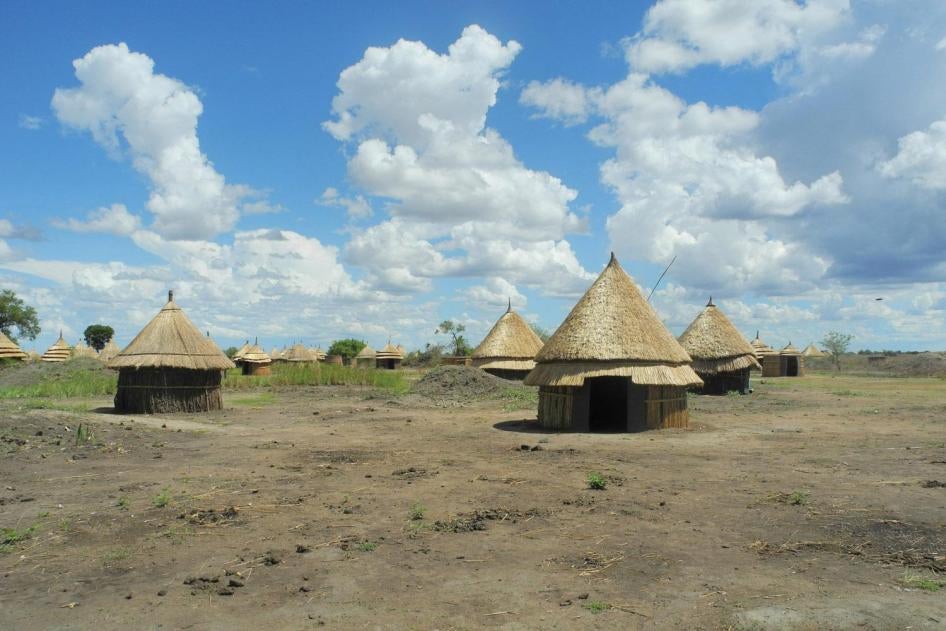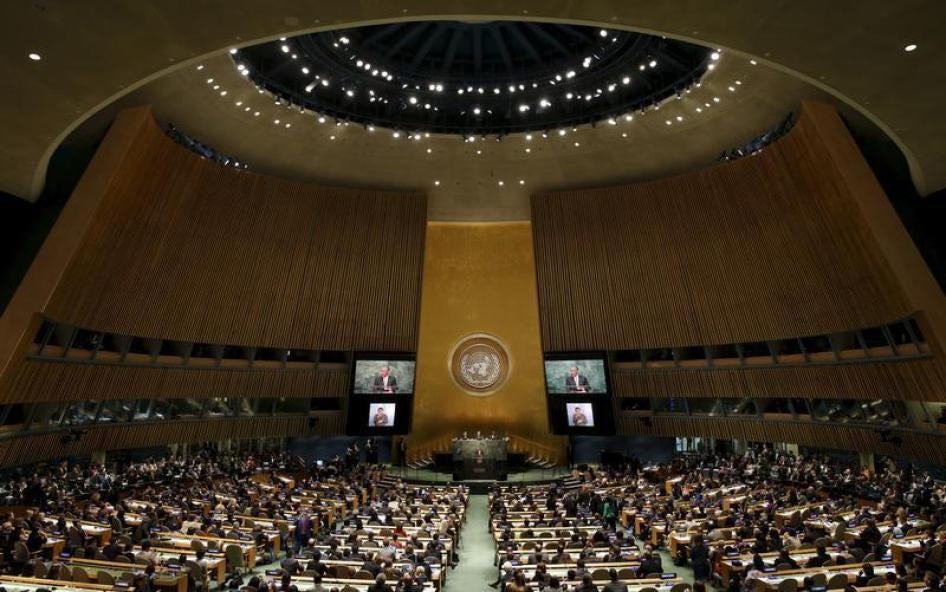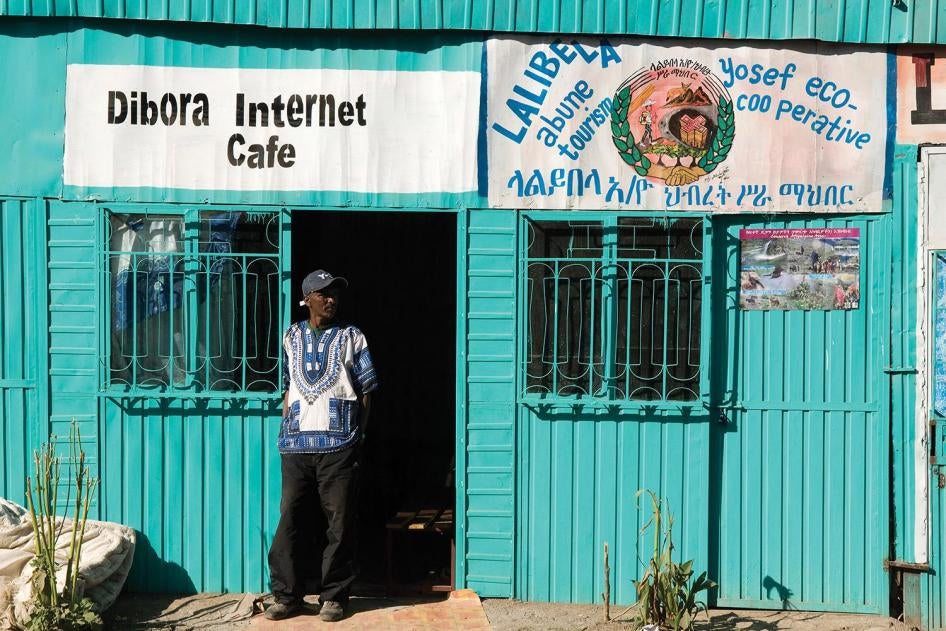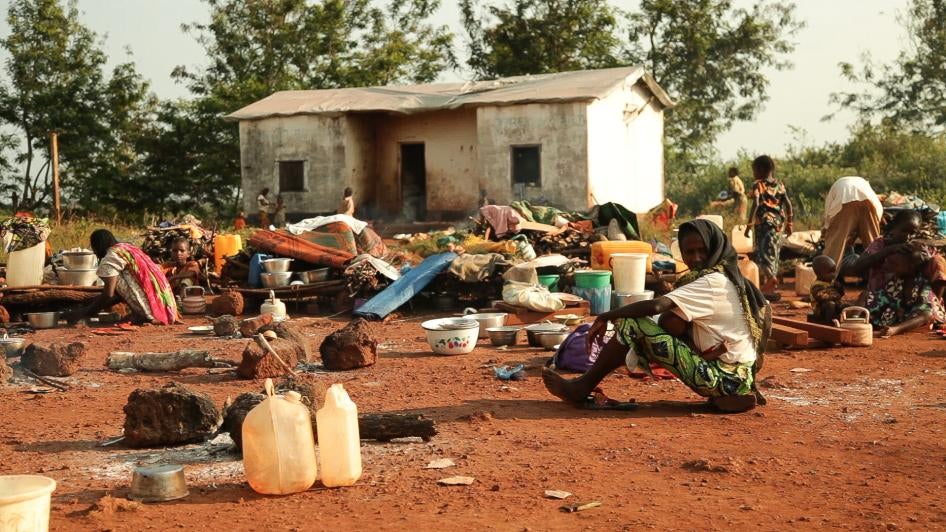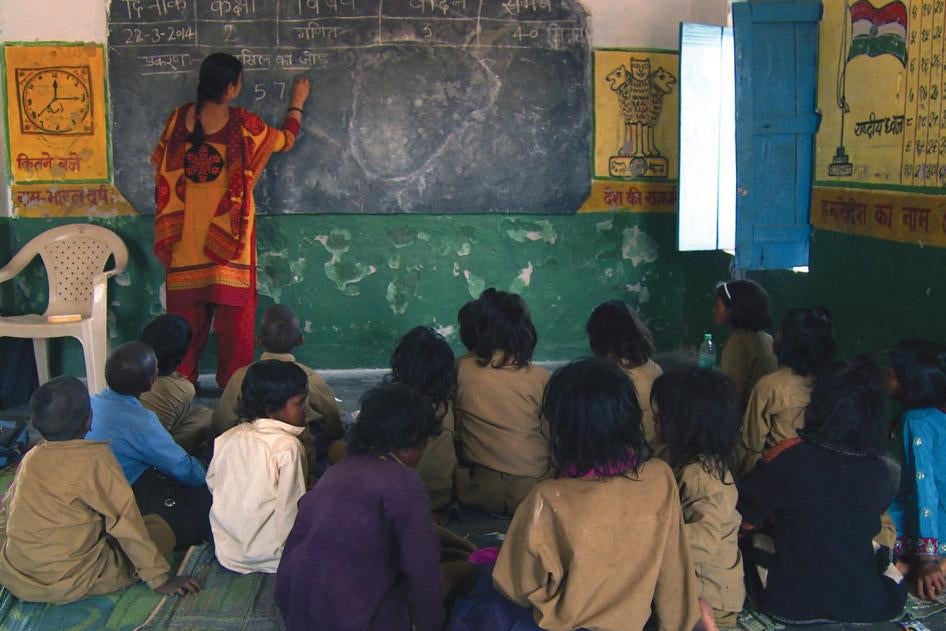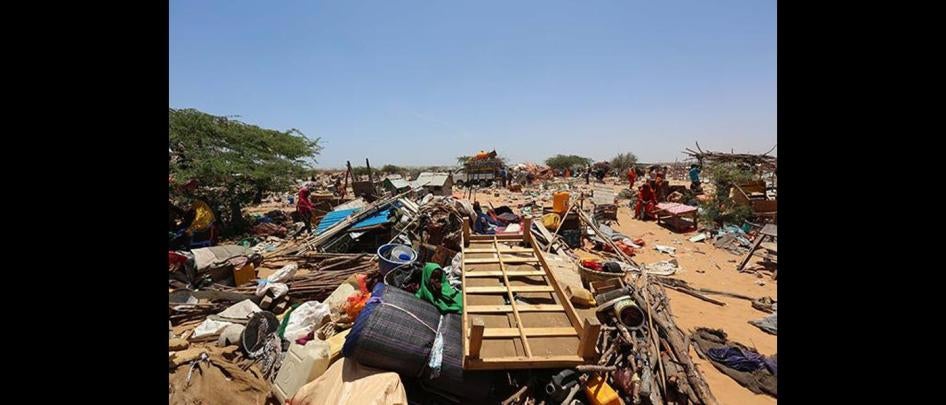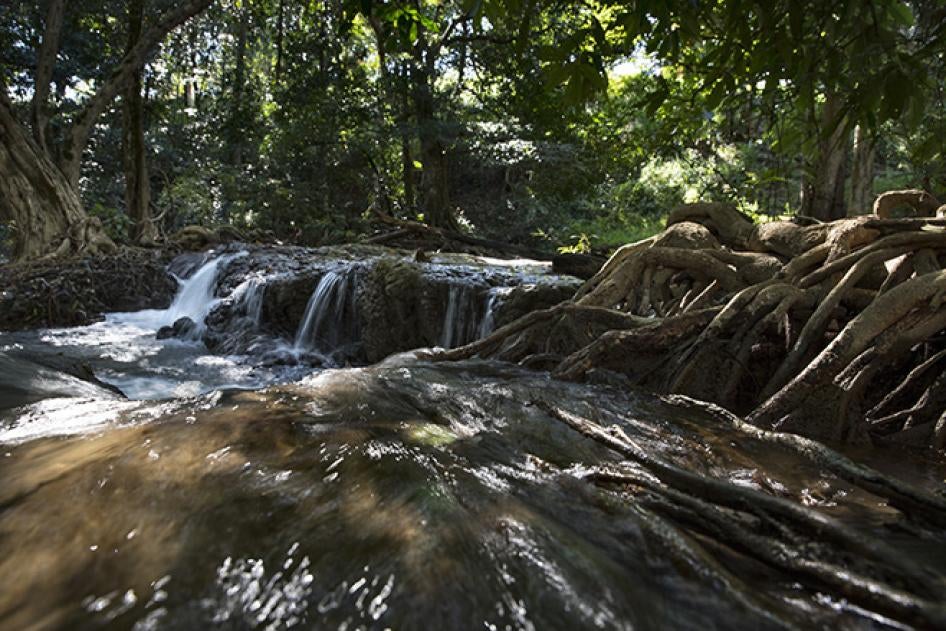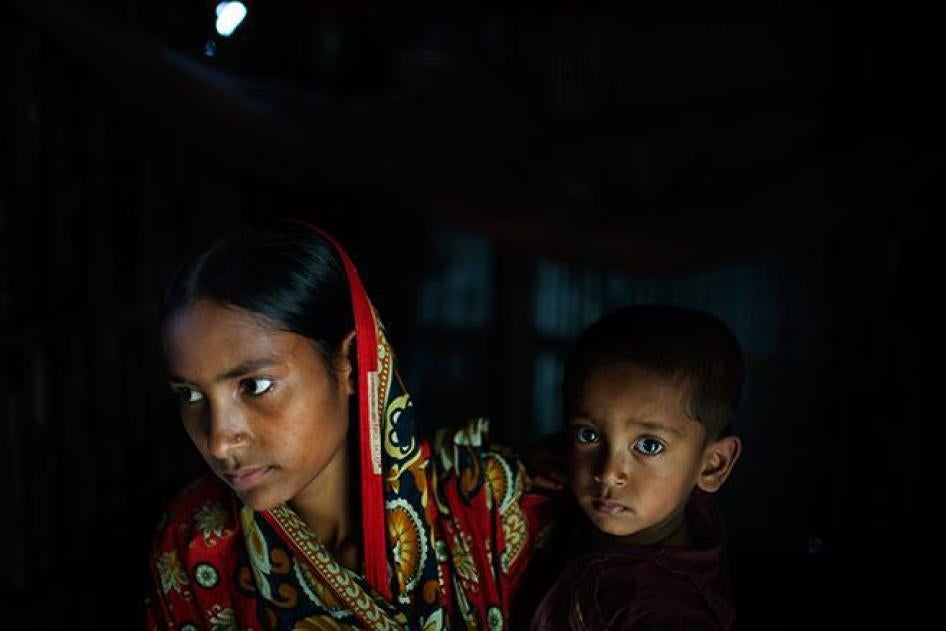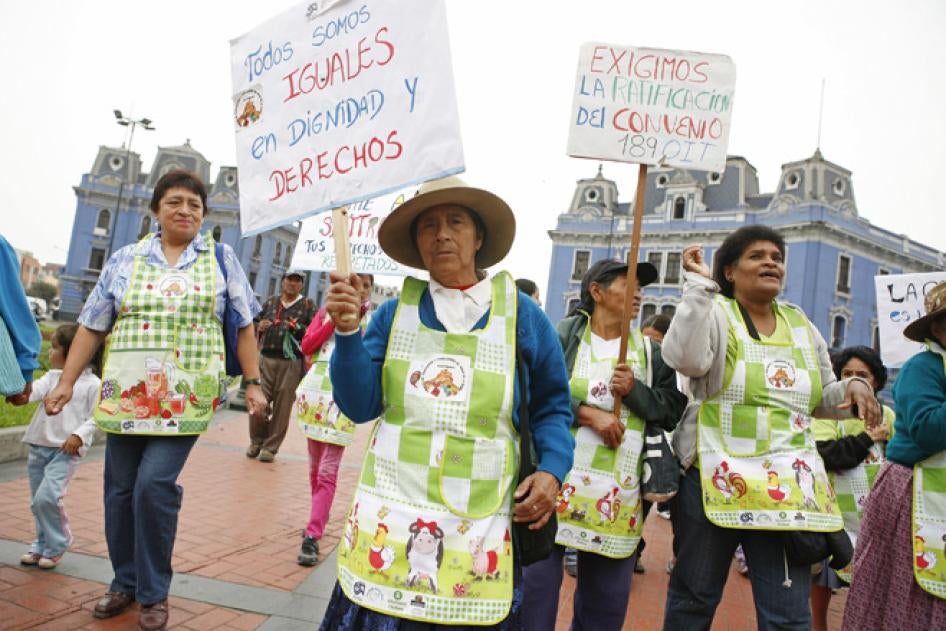Righting Development

In late September 2015, the UN General Assembly will formally adopt a new sustainable development agenda that builds upon the progress the international community has made towards the Millennium Development Goals. In the consultations that will take place at the UN Summit, member states, intergovernmental and civil society organizations should place human rights at the center of efforts to tackle poverty and promote environmentally sustainable economic development. In the lead-up to the summit, Human Rights Watch will be publishing a series of articles that bring a human – and human rights – focus to what is sometimes an abstract discussion around these goals.
Keeping Rights at the Center of Climate Change Debate
Xiuhtezcatl Martinez and his brother Itzcuauhtli were among the thousands who descended on New York last week for the Development Summit at the United Nations, a couple of indigenous teens from Colorado, artist-activists sharing their eco-tinged brand of hip hop.
They joined many voices – from Mary Robinson to the Pope – calling on governments to act to ensure climate action and human rights become integral parts of the post-2015 development agenda.
The Martinez brothers’ message is pretty simple: “Young people are standing up all over the planet, because we see that climate change is a human rights issue.”
The brothers are not wrong. The consequences for much of the earth’s population of a warming planet are already being felt. That’s why responses to climate change and human rights need to be at the center of any approach to sustainable development.
Human rights bodies, scientists, governments, and civil society groups are already documenting the implications of climate change for human rights. Increasing temperatures and extreme weather events threaten people’s basic rights to water, food and health, especially in countries with limited resources and fragile ecosystems. For vulnerable populations and marginalized communities these events are often linked to the loss of lives, homes, and livelihoods.
After a strong push from civil society, governments have agreed to include both action on climate change and human rights in the post-2015 global development agenda. Goal 13 of the Sustainable Development Goals (SDGs) calls for “urgent action to combat climate change and its impacts.” That makes sense because development efforts need to protect rights from the effects of climate change, particularly the rights of the most vulnerable communities.
But this work has just begun. So far, the integration of climate action and human rights has been rhetorical. To move from words to action, governments should ensure human rights become a central element of the future climate change agreement to be adopted in Paris later this year.
After the Fanfare, What Progress Will Be Made?
So, after all the rhetoric and fanfare and marches and celebrity appearances, when the presidents and prime ministers have all gone home and the Sustainable Development Goals have been formally approved, what will have changed for the world’s three billion people living on less than $2.50 per day?
Whatever the limitations of the SDGs, the real challenge now is to support and promote their implementation. To succeed, progress needs to be scrutinized and governments held to account for the commitments they have made to the very communities and people whose lives they affect.
On this front, there are reasons for concern. The mechanisms for monitoring and reviewing the post-2015 agenda are “vague and entirely voluntary,” according to one expert closely involved with the process.
How could they be improved? Start by including a regular, global review of progress on SDGs similar to the Universal Periodic Review of the United Nations Human Rights Council in which every government has to present its human rights record for scrutiny by other governments every five years. That can be supplemented with comprehensive reporting by governments, civil society groups and the UN system to ensure the most complete and credible analysis of progress.
But just as importantly, holding governments to account depends on open participation by civil society – at the local, national, regional and international levels. As the recent report of the special rapporteur for human rights defenders noted, those “promoting and defending rights relating to land, the environment and corporate responsibility” are the most vulnerable to attacks, intimidation, forced disappearances and other threats. These are the very people working on issues of just and sustainable development. Human Rights Watch’s own work has found that the World Bank has “done little to prevent or dissuade governments from intimidating critics of the projects it funds, or monitor for reprisals.”
For the SDGs to have a chance to reach their lofty targets, governments and major international institutions, including development donors, both need to recognize that a vibrant civil society, a free media, genuinely democratic political processes, and an independent judiciary are essential for the impoverished and marginalized to be able to demand accountability for progress made - and not made. Ultimately, development has to mean enhanced freedom – especially for those at greatest risk.
Opening up the Internet to Close the Poverty Gap
The Internet has become like “the air we breathe.” It’s where many of us work, communicate, collaborate and solve problems. There was a time when Internet access was really more of a luxury than basic need, but no longer.
But more than half the world – 4 of the 7 billion people on the planet today - do not have Internet access and have never gone online.
This digital divide has huge implications for hopes of achieving the Sustainable Development Goals being finalized at this week’s UN summit. How will global inequality be reduced if Internet access is not available to most people? How is it feasible to make progress on inclusive participation in governance decisions if Internet access is denied to most?
Since, the ability to access and share information is central to the enjoyment of core civil and political rights, such as freedom of expression and freedom of assembly and association, those without access to the internet, are at a huge disadvantage.
Internet access should also be recognized as an essential element in the right to education. Those without Internet access lack a basic means of accessing information and communicating their ideas. Goal 4 of the SDGs – Ensure inclusive and equitable quality education and promote lifelong learning opportunities for all –will fail if Internet access is not recognized as core to inclusive education.
Similarly, lack of Internet infrastructure and access bars many from participation in this global economic and problem solving activity. Progress on Goal 8 of the SDGs – Promote sustained, inclusive and sustainable economic growth, and Goal 10 of the SDGs - Reduce Inequality Between and within countries – is not possible, if access to the Internet is not prioritized. In fact, failure to dramatically expand Internet access could lead to a widening inequality gap, not the narrowing envisioned in the SDGs.
So it’s time to start recognizing that progress on SDGs depends on vastly expanded Internet access. The eradication of poverty, ending hunger, ensuring healthy lives, achieving gender equality, preventing climate change, and promoting peaceful and sustainable societies cannot be accomplished without dramatic expansion of information communication technology infrastructure. Work related to all of these goals rests upon Internet access for those who are most affected by these problems, and whose involvement in solving these problems is essential.
Why Justice Matters for Development
It’s a no-brainer to say sustainable economic development requires stability. In its 2011 development report, the World Bank warned that “a major episode of violence, unlike natural disasters or economic cycles, can wipe out an entire generation of economic progress.” Moreover, “repeated cycles of violence” exact “human, social, and economic costs that last for generations.”
Inclusive Education in India Key to Reducing Inequality
India has made significant progress on universalization of primary education, one of the 10 millennium development goals, after enacting the Right of Children to Free and Compulsory Education Act in 2009. But the pursuit of these education goals also taught India and the world an important lesson: By focusing on enrollment alone, in an unequal society, it failed to ensure that children stay in school and receive quality education.
According to Indian government estimates, six million children are out of school – and more crucially, two out of five drop out before completing elementary schooling. Numbers are much higher for children from the disadvantaged Dalit (so-called untouchables), Muslim, and tribal communities. Ensuring access to education for children with disabilities remains a serious challenge. Discrimination against children from these most vulnerable communities, often first generation learners in their families, means the right-to-education law is failing those who need it the most. Lack of effective monitoring by authorities to check age-old prejudices by school staff means at worst, ill-treatment, and at best, neglect.
This month, India will commit to the new global development agenda for the next 15 years by endorsing the Sustainable Development Goals (SDGs). This is an opportunity to set things right, for India to shift focus from enrollment to inclusive, equitable, and quality education as envisioned in Goal 4.
The government should commit to “zero discrimination” in classrooms, train teachers to focus on inclusive learning practices that are effective, and ensure greater participation of children from marginalized communities and healthy interaction among children from different backgrounds. At the same time, the authorities need to develop guidelines to better identify and respond to discrimination in schools.
Effective monitoring and accountability at both the domestic and the international level will be crucial to success. First there needs be better data collection on children who drop out, breaking it down by gender, social groups, and religious minorities among others. It needs a process to monitor and track children from enrollment to graduation and a consistent approach to identifying children who are out of school, have dropped out, or are at risk of dropping out.
Much is at stake here. The United Nations secretary-general has said “sustainable development begins with education.” The new agenda seeks to reduce inequality within and among countries and ensure equal opportunity for all. Here, India, which dominates the world’s poorest 10 percent, will have a critical role. Even as India’s wealth has risen in the last two decades, millions of families have been left behind. Unequal access to quality education perpetuates an impoverished underclass with sharply limited economic opportunity among other things. A country where a child spends her first years in school experiencing she is less worthy than others cannot hope to provide her equal access of opportunity when she grows up 15 years from now.
Safe and Inclusive Settlements Key to Tackling Displacement Crisis in Somalia
Faiso, a 34-year-old mother of nine, has been living in informal displaced people’s settlements in Somalia’s capital, Mogadishu, since the 2011 famine. In March this year, government forces violently evicted Faiso and her children – along with 20,000 other displaced people – from their settlement without warning.
Why Healthy Development Requires Accountability
When global leaders meet at the United Nations in New York later this week to adopt the Sustainable Development Goals (SDGs), they’d do well to learn the harsh lesson on display in the Thai village of Lower Klity Creek: healthy and just development requires accountability.
Lower Klity Creek, in the jungle near Thailand’s border with Burma, is home to about 400 ethnic Karen people, most of whom are subsistence farmers. The area is one of the most heavily polluted industrial sites in Thailand. Eleven kilometers upstream is a former lead-processing factory that started processing ore from nearby mines in the mid-1960s and was ordered closed in 1998. But its toxic legacy remains.
To this day, residents of Lower Klity Creek continue to be exposed to toxic lead – as they have for decades. Many suffer symptoms of chronic lead poisoning, such as abdominal pain, headaches, fatigue, and mood changes. Some children have been born with severe intellectual and developmental disabilities.
The slow-moving disaster in Lower Klity Creek shows what is at stake in the SDG’s pledge that no one be left behind. But it also reveals how important accountability is in ensuring that the promise is more than empty rhetoric.
Community members in Lower Klity Creek have advocated for years for the Thai government to address the poisonous residue from lead mining. They pursued a lawsuit in the courts, and on January 10, 2013, finally prevailed. For the first time in Thailand’s history, a high court ordered the government to protect the health of local residents by cleaning up a toxic site. But more than two years later, the joy of that victory has faded. The Pollution Control Department has commissioned more studies of contamination but is yet to begin a clean-up.
So as government leaders meet to adopt the Sustainable Development Goals, we should remember that setting the goals is the first – and easiest – step. Real transformation will require holding governments accountable when they violate the rights of their citizens. Without respect for human rights, the positive rhetoric in the UN’s halls may be unmatched in the communities bearing the brunt of environmental, social, and economic development will remain “out of balance.”
Girls on the Edge (of Disaster)
“If the river takes our house it will be hard for you to get married – so it’s better if you get married now,” Azima B.’s parents told her, explaining why she had to marry at age 13. The family lives in rural Bangladesh, in the path of the Meghna River which is shifting course and eating away meters of land every year, taking houses and fields with it.
Bangladesh’s extreme vulnerability to natural disasters has been exacerbated by climate change. Combined with the country’s dense population, this means many poor families find their livelihoods, homes, and land under constant threat from flooding, river erosion, cyclones, and other disasters. Struggling to survive, these families cope however they can – and often their daughters pay the highest price. Girls are taken out of school because the family can’t afford education costs, and are married off so there is one less mouth to feed.
Bangladesh is not the only place where women and girls bear the brunt of climate change – this is a global phenomenon. Women are more vulnerable because they are poorer and more marginalized and because discriminatory gender roles make it harder for them to cope. Women are also contributing to solutions at a local and global level but their achievements are often overlooked. Sustainable Development Goal (SDG) 13 acknowledges this in passing with a call for improved management of climate change in least developed countries and small island developing states, “including focusing on women, youth and local and marginalized communities.”
But this is nowhere near enough. As they work to mitigate the impacts of climate change, all governments – rich and poor – should assess the harm to the rights of women and girls, and ensure they have access to adaptation tools and support. SDG indicators should detail how this should be done, and track governments’ successes – and failures – at protecting and promoting women and girls’ rights in the context of a changing and increasingly unpredictable climate.
Climate change is a women’s rights issue.
Protecting Labor Rights Crucial Step to Reducing Poverty
In hundreds of interviews with migrant domestic workers around the world over the past decade, I always ended our conversation by asking what their government could do to end abuses.
Many said a weekly day off should be legislated to give them a break from excessive workloads and 16-hour days. A common response was simply getting paid on time and in full – the International Labor Organization (ILO) estimates that employers cheat domestic workers in forced labor out of an astounding US$8 billion each year.
This week governments will gather in New York to adopt the “post-2015 agenda,” a laudable set of Sustainable Development Goals (SDGs) and targets to rid the world of persistent poverty, inequality, and violence. Goal 8 centers on economic growth, employment, and decent work, and is divided into 12 targets to focus funding and action.
My hopes were raised by the language of Target 8.8 to “Protect labour rights and promote safe and secure working environments for all workers, including migrant workers, in particular women migrants, and those in precarious employment.” Migrant workers are at especially high risk of falling victim to pervasive abuses such as unpaid wages, hazardous work, confinement to the workplace, inadequate housing and food, and in many cases, physical or sexual violence. Gaps in labor laws and restrictive labor migration policies trap them with abusive employers and give them few or no avenues for getting help.
But my hopes fell when I saw the suggested indicators to measure progress on Target 8.8 narrowly focused on occupational injuries and death and on the number of international labor treaties a government had ratified. Data on workplace injury is an important and worthy indicator, but also likely to have yawning gaps when it comes to the invisible workforce of undocumented migrants or those in informal sectors such as women working in private households.
Committing to uphold international labor treaties is an important step, but is a process indicator and ultimately, a poor proxy for tracking actual progress on the ground. The bigger question is how to ensure and measure implementation of these important standards.
Indeed, one of the least developed aspects of the entire post-2015 agenda is how it will be monitored and mechanisms for accountability. A group of human rights organizations, including Human Rights Watch, have advocated for independent stakeholder reports and a role for civil society. Inputs and participation from experts, labor unions, and other workers’ organizations on Target 8.8 would provide crucial evidence and analysis on whether, for example, a government’s ratification of the ILO’s Domestic Worker Convention was actually translating into safer working environments for migrant domestic workers.
Such accountability is the minimum owed to workers, including migrant domestic workers, who have clear and concrete ideas of what governments should do to better protect their labor rights and end exploitation.
This Time, Education Genuinely for All
“Do you really think my child can go to school?”
Nomsa, the mother of a 10-year-old boy with various disabilities, who lives in the rural town of Manguzi, in South Africa’s KwaZulu-Natal province, was recounting how difficult it was to find a school that would take her son, Sandile. I asked her what the government had done to see to it that Sandile could go to school on an equal basis with his twin sister, who did not have disabilities. The answer: almost nothing.
In many countries, parents acknowledge the importance of education but ask themselves how they are going to make it happen. How are we going to send our children to a far-away school? How will we pay for everything? Who will guarantee them a place in a school? The last question morphs into a day-to-day struggle particularly for children forced to overcome multiple barriers before they even enter a classroom due to ethnic and gender discrimination, exclusion and inaccessibility due to their disabilities, or because, caught in a conflict or emergency zone, the very institutions where they should receive an education have been attacked by armed groups. Like Sandile, millions of school-aged children and adolescents continue to be left out.
Today, children and parents are still grappling with fundamental issues which should have long been tackled by governments.
As early as 2000, governments committed to implement the Millennium Development Goal on universal primary education, guaranteeing that all girls and boys would be enrolled in primary school by 2015. But many governments have still not adopted plans to make education free and available to all children. Paying for school – one of the biggest barriers still for many primary not just secondary-going children – continues to be a reality in many countries around the globe.
Governments should have removed school fees for primary education as early as 1970, when many states began to accept new obligations to provide free and compulsory primary education, free from discrimination, or from 1990 onwards, when they signed up to the Convention on the Rights of the Child, accepting further obligations to guarantee education for all children.
The 2000-2015 period was crucial to show how governments could implement their international development commitments, while adhering to their human rights obligations. Some countries made impressive gains in primary school enrollments, but millions of children continue to be left out of primary schools and many adolescents have no secondary schools to go to.
This week, all governments will commit to a new 15-year global development framework, the Sustainable Development Goals, that specifically requires them to implement ten education targets, with a notable commitment to ensure that “all girls and boys complete free, equitable and quality primary and secondary education” by 2030. Governments should use this key milestone to announce how they will undertake the much needed legal and policy reforms, allocate the necessary resources, and make the national investments to show how they will get education right by 2030.
